

Swiss Digital Agenda sur Twitter : "spannende Konversation über die Wichtigkeit von #digitalem Training bei @GovFaces mit @CWICKET. Swiss Digital Agenda started a conversation to Christian Laux about Media and Internet. Aujourd’hui, la pression en matière de protection des données est principalement le fait de législateurs soucieux de protéger leurs citoyens contre les dérives des entreprises.
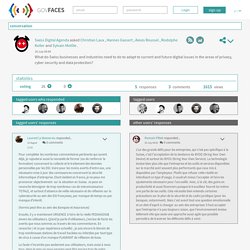
En dépit de certaines affaires retentissantes et de réactions outragées (mais éphémères), les particuliers ne se soucient guère de la protection de leurs données privées et privilégient le confort de services personnalisés et souvent gratuits. Rien n’indique qu’il en ira toujours ainsi. Un traitement des données parcimonieux et respectueux des individus est susceptible de devenir un avantage concurrentiel. A cet égard, le succès d’estime du service de messagerie chiffrée Threema signale peut-un changement d’attitude des usagers et une nouvelle dynamique du marché. Creative and competitive Europe? Digital Agenda Assembly 2013 opens. Post-conference workshop "Reinventing Democracy in the digital revolution era"
Rencontres Cap Digital 2011. UK Pirate Party’s Guide to the Digital Economy Act. A lot has been written about the UK’s controversial Digital Economy Act, which passed in April in the last days of Gordon Brown’s government.
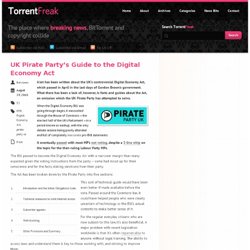
What there has been a lack of, however, is facts and guides about the Act, an omission which the UK Pirate Party has attempted to solve. UK regulator turns over Internet policing standards to movie and record industries. When the last UK Parliament rushed the Digital Economy Act into law without debate, hours before it dissolved for the election, it appointed Ofcom, the telcoms regulator, to work out the details.
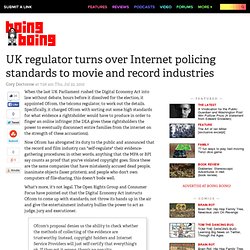
Specifically, it charged Ofcom with sorting out some high standards for what evidence a rightsholder would have to produce in order to finger an online infringer (the DEA gives these rightsholders the power to eventually disconnect entire families from the internet on the strength of these accusations). Now Ofcom has abrogated its duty to the public and announced that the record and film industry can "self-regulate" their evidence-gathering procedures; in other words, anything that the MPA or BPI say counts as proof that you've violated copyright goes. Since these are the same companies that have mistakenly accused dead people, inanimate objects (laser printers), and people who don't own computers of file-sharing, this doesn't bode well.
UK regulator turns over Internet policing standards to movie and record industries. Hadopi : le Royaume-Uni envisage le filtrage des hotspots - PC I. Avec son projet destiné à réprimer les téléchargements hors marchés, le Royaume-Uni se confronte comme en France à la problématique des réseaux Wi-Fi ouverts, ces fameux Hotspots d’entreprises, universités, bibliothèques, etc.
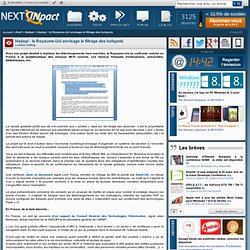
La riposte graduée plutôt que de s’en prendre aux « pirates », tape sur les doigts des abonnés : c’est le propriétaire de l’accès internet qui se retrouve aux premières lignes puisqu’on lui reproche de ne pas avoir sécurisé « son » accès d’où des fichiers illicites auront été échangés. Une justice facile qui évite tant de tracasseries (perquisition, etc.) et permet des actions de masse.
Arstechnica. Numerama. Ecrans.fr. Ofcom unveils anti-piracy policy. 28 May 2010Last updated at 14:38 Some nations are threatening to cut off persistent copyright infringers Lists of Britons who infringe copyright are to be drawn up by the UK's biggest ISPs, under proposals from the regulator Ofcom.
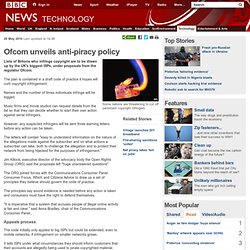
The plan is contained in a draft code of practice it hopes will curb copyright infringement. Names and the number of times individuals infringe will be logged. Music firms and movie studios can request details from the list so that they can decide whether to start their own action against serial infringers. However, any suspected infringers will be sent three warning letters before any action can be taken. The letters will contain "easy to understand information on the nature of the allegations made against the subscriber and on what actions a subscriber can take, both to challenge the allegation and to protect their network from being hijacked for the purposes of infringement.
" Appeals process Ofcom said the code should come into force in early 2011. UK ISPs Take Digital Economy Act to High Court. Two of the UK's leading Internet service providers are teaming up to challenge the Digital Economy Act.
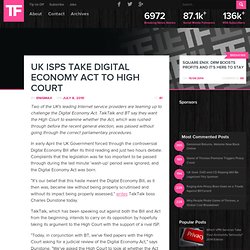
TalkTalk and BT say they want the High Court to examine whether the Act, which was rushed through before the recent general election, was passed without going through the correct parliamentary procedures. In early April the UK Government forced through the controversial Digital Economy Bill after its third reading and just two hours debate. Complaints that the legislation was far too important to be passed through during the last minute ‘wash-up’ period were ignored, and the Digital Economy Act was born.
“It’s our belief that this haste meant the Digital Economy Bill, as it then was, became law without being properly scrutinised and without its impact being properly assessed,” writes TalkTalk boss Charles Dunstone today. “Today, in conjunction with BT, we’ve filed papers with the High Court asking for a judicial review of the Digital Economy Act,” says Dunstone.